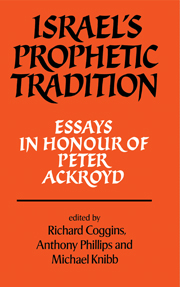Book contents
- Frontmatter
- Contents
- Preface
- Biographical note
- Abbreviations
- Note
- Prophecy in the ancient Near East
- The origins of prophecy in Israel
- Three classical prophets: Amos, Hosea and Micah
- The Isaiah tradition
- An alternative prophetic tradition?
- Visionary experience in Jeremiah
- The Ezekiel tradition: prophecy in a time of crisis
- The prophets of the restoration
- Prophecy and the emergence of the Jewish apocalypses
- Prophecy and wisdom
- Prophecy and the cult
- Prophecy and law
- A change of emphasis in the study of the prophets
- Martin Buber and the interpretation of the prophets
- Index of Biblical References
Prophecy in the ancient Near East
Published online by Cambridge University Press: 09 January 2010
- Frontmatter
- Contents
- Preface
- Biographical note
- Abbreviations
- Note
- Prophecy in the ancient Near East
- The origins of prophecy in Israel
- Three classical prophets: Amos, Hosea and Micah
- The Isaiah tradition
- An alternative prophetic tradition?
- Visionary experience in Jeremiah
- The Ezekiel tradition: prophecy in a time of crisis
- The prophets of the restoration
- Prophecy and the emergence of the Jewish apocalypses
- Prophecy and wisdom
- Prophecy and the cult
- Prophecy and law
- A change of emphasis in the study of the prophets
- Martin Buber and the interpretation of the prophets
- Index of Biblical References
Summary
An investigation of prophecy in the ancient Near East must start with a definition of the term. What is prophecy? On the basis of the Old Testament evidence prophecy may tentatively be defined as the proclamation of divine messages in a state of inspiration. The Old Testament prophets proclaim messages from Yahweh speaking in his name and using the messenger formula kō'āmar YHWH, ‘Thus says Yahweh.’ In these messages, that is to say, Yahweh speaks in the first person. The character of the inspiration varies: the term ḥāzāh indicates some kind of vision, other passages refer to auditions, as e.g. Isa. 5: 9.
Egypt offers very little that is comparable to Old Testament prophecy. Inspired persons are not mentioned, oracles proclaimed by the aid of the statues of the gods hardly deserve to be called prophecy. The fact that the Greeks rendered the priestly title ḥm-nṯr by prophētēs can hardly substantiate the identification of these priests with the Hebrew prophets. It rather seems that they were oracle priests who reported the answers of the gods to questions put to them by the worshippers. There is an expanded form of the title, ḥm-nṯr wḥmw, which probably means ‘reporting servant of the god’, and it is likely that this refers to their duty of reporting on the answers they received from the god. The term wḥmw, ‘reporter’ or ‘herald’, is also applied to the bulls Apis and Mnevis as mediators of oracles (Morenz, 1960, p. 109).
Lanczkowski (1960) has tried to interpret the so-called Lament of the Eloquent Peasant as an example of Old Egyptian prophecy.
- Type
- Chapter
- Information
- Israel's Prophetic TraditionEssays in Honour of Peter R. Ackroyd, pp. 1 - 11Publisher: Cambridge University PressPrint publication year: 1982



